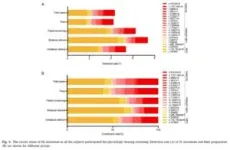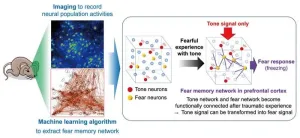(Press-News.org) A world-first clinical trial published in JAMA could provide an easy way to save tens of thousands of units of blood every year in Canada and much more worldwide. The trial, which involved more than 27,000 patients in 25 adult intensive care units (ICUs) across Canada, showed that taking less blood for lab tests using “small-volume” tubes reduced the need for almost one blood transfusion for every 10 patients.
Most hospitals use standard tubes that automatically draw four to six milliliters (ml) of blood, but a typical laboratory test requires less than 0.5 ml of blood, meaning the rest (more than 90%) is wasted. Commercially available small-volume tubes have a weaker vacuum inside that automatically draws up to half as much blood.
“While the amount of blood drawn per tube is relatively small, ICU patients typically require multiple blood samples taken multiple times every day. This can add up to significant blood loss that contributes to anemia, or low red blood cells. ICU patients are unable to produce more red blood cells to correct for this blood loss and often require treatment with a blood transfusion,” said senior author Dr. Deborah Siegal, a scientist and hematologist at The Ottawa Hospital who led the trial, which was coordinated, sponsored and funded by the Population Health Research Institute (PHRI) in Hamilton, a joint institute of McMaster University and Hamilton Health Sciences.
“This trial showed that we can save one blood transfusion for every 10 ICU patients by simply switching to small-volume tubes for blood collection,” said Dr. Siegal, who maintains appointments with McMaster University and PHRI, in addition to the University of Ottawa. “At a time when everyone is trying to find ways to make health care more sustainable, and preserve our supply of blood products, this study provides a simple solution that can be implemented without additional cost or negative effects. The patients in our study received over 36,000 blood transfusions. With small-volume tubes we may have saved about 1,500 units of blood.”
In Canada, the costs associated with blood transfusions ($450 per unit of blood, with additional costs to hospitals for testing, preparation, storage, etc.) are covered by the public health system. Blood donors are not paid, and blood conservation is a priority as shortages are common.
The study also has important implications for patients, as low red blood cells (anemia) can leave patients feeling tired and weak and is associated with can lead to other complications and longer hospital stays. While blood transfusions can usually correct anemia, there can be rare side effects, such as difficulty breathing, allergic reactions and infections.
The trial employed an innovative design that involved randomizing different ICUs to use either small-volume blood collection tubes or regular tubes for different periods of time, before switching to the other tubes. The researchers used electronic medical records to track how many blood transfusions were given to each patient, excluding patients who stayed for less than 48 hours in the ICU.
While previous observational studies have supported the use of small-volume tubes, this is the first clinical trial to rigorously test them in the hospital setting. In addition to finding that the small-volume tubes reduced anemia and the need for blood transfusions, the trial also confirmed that the smaller volume of blood did not compromise laboratory testing. When the researchers excluded results from the height of the pandemic (five months of data), the trends were the same, but did not reach statistical significance.
Full reference: Small-Volume Blood Collection Tubes to Reduce Red Blood Cell Transfusion in the Intensive Care Unit: A Randomized Clinical Trial (JAMA). 12 Oct 2023. Deborah M. Siegal, Emilie P. Belley-Cote, Shun Fu Lee, Stephen Hill, Frédérick D’Aragon, Ryan Zarychanski, Bram Rochwerg, Michaël Chassé, Alexandra Binnie, Kimia Honarmand, François Lauzier, Ian Ball, Waleed Al-Hazzani, Patrick Archambault, Erick Duan Kosar Khwaja, François Lellouche, Paul Lysecki, François Marquis, Jean-François Naud, Jason Shahin, Jennifer Shea, Jennifer L.Y. Tsang, Han Ting Wang, Mark Crowther, Donald M. Arnold, Emily Di Sante, Gladys Marfo, Tanya Kovalova, Sylvanus Fonguh, Jessica Vincent, Stuart J. Connolly. Post-embargo link: https://jamanetwork.com/journals/jama/fullarticle/10.1001/jama.2023.20820?guestAccessKey=2ed7c03e-e7ce-427d-bafb-1ec5d60c5cd5&utm_source=For_The_Media&utm_medium=referral&utm_campaign=ftm_links&utm_content=tfl&utm_term=101223
Funding: The STRATUS study (Small-Volume Tubes to Reduce Anemia and Transfusion - NCT03578419) was funded by the Hamilton Academic Health Sciences Organization and the Population Health Research Institute (PHRI) and coordinated by PHRI. Dr. Siegal is currently supported by a Canada Research Chair (Tier 2) in Anticoagulant Treatment of Cardiovascular Disease, in addition to other research grants.
Media contact: Jenn Ganton, Ottawa Hospital Research Institute, jganton@ohri.ca, 613-614-5253
By the numbers:
97: Percentage of patients who develop anemia after 8 days in the ICU
50: Percentage of transfusions given in the ICU in the absence of active bleeding
41: Amount of blood (in ml) taken per ICU patient per day for routine blood tests (equivalent of one full blood donation every 8 days)
75: Percentage of patients who receive at least one blood transfusion within seven days of ICU admission (40% of all ICU patients)
$450: Cost per unit of blood in Canada (not including indirect costs associated with testing, preparation, storage, administration, reactions)
90: Percentage of blood that is wasted in routine lab tests
10: Units of blood that could be saved per 100 patients with ICU stays of more than 48 hours if the results of this study were implemented END
Big blood savings: large trial in JAMA shows taking less blood for lab testing reduces transfusions in intensive care
2023-10-12
ELSE PRESS RELEASES FROM THIS DATE:
We can respond to verbal stimuli while sleeping
2023-10-12
Sleep is generally defined as a period during which the body and mind are at rest—as if disconnected from the world. However, a new study led by Delphine Oudiette, Isabelle Arnulf, and Lionel Naccache at Paris Brain Institute shows that the frontier between wakefulness and sleep is much more porous than it seems.
The researchers have shown that ordinary sleepers can pick up verbal information transmitted by a human voice and respond to it by contracting their facial muscles. This astonishing ability occurs intermittently during almost all stages of sleep—like windows of connection with the outside world were temporarily opened on this occasion.
These new findings ...
Flagship individuals can boost conservation
2023-10-12
“Flagship” individual animals like Cecil the lion or Freya the walrus can boost conservation, new research suggests.
Much-loved species like pandas and polar bears are widely used in conservation campaigns.
However, a new study argues that individual animals or plants can also be used as flagships, with enormous potential to raise awareness and mobilise public support.
The recent outcry over the felling of the “Sycamore Gap” tree in the UK demonstrates the power of individual plants or animals in public opinion.
“Flagship individuals typically share some common characteristics,” ...
Letting go of an extra weight to control sleeping sickness
2023-10-12
Letting go of an extra weight to control sleeping sickness
A new study led by Luísa Figueiredo, group leader at the Instituto de Medicina Molecular João Lobo Antunes (iMM; Portugal), and published today in the scientific journal Nature Microbiology* found a new strategy by the host to cope with Trypanosoma brucei infection. Trypanosoma brucei is the parasite that causes sleeping sickness in humans, and nagana in cattle, which remain a public health ...
Simulations of ‘backwards time travel’ can improve scientific experiments
2023-10-12
Physicists have shown that simulating models of hypothetical time travel can solve experimental problems that appear impossible to solve using standard physics.
If gamblers, investors and quantum experimentalists could bend the arrow of time, their advantage would be significantly higher, leading to significantly better outcomes.
Researchers at the University of Cambridge have shown that by manipulating entanglement – a feature of quantum theory that causes particles to be intrinsically linked – they can simulate what could happen if one could travel backwards in time. So that gamblers, investors and ...
Extraordinary fossil find reveals details about the weight and diet of extinct saber-toothed marsupial
2023-10-12
Recent paleontological explorations in the Tatacoa Desert in Colombia led to the recovery of the most complete skeleton of a "saber-toothed marsupial” discovered in northern South America. The specimen belongs to the species Anachlysictis gracilis, which is part of a group of extinct predatory mammals known as sparassodonts, that lived in South America during the Cenozoic, after the extinction of the dinosaurs.
This species lived approximately 13 million years ago in the area known among paleontologists as ‘La Venta’, in the current La Tatacoa desert, a tropical dry forest that “at that time was a tropical rainforest, similar to the current Amazon,” said ...
Traumatic memories can rewire the brain
2023-10-12
Okazaki, Japan – Scientists have long speculated about the physical changes that occur in the brain when a new memory is formed. Now, research from the National Institute for Physiological Sciences (NIPS) has shed light on this intriguing neurological mystery.
In a study recently published in Nature Communications, The research team has succeeded in detecting the brain neuronal networks involved in trauma memory by using a novel method that combines optical and machine-learning-based approaches, capturing the complex changes that occur during memory formation and uncovering the mechanisms by which trauma memories ...
Could you correctly identify someone wearing sunglasses from a distance of 20 meters?
2023-10-12
This comprehensive study focused on three key factors: distance, lighting and facial masking, and their impact on the ability of eyewitnesses to later correctly identify individuals they have seen. In the study, eyewitnesses were asked to identify perpetrators they had seen from various distances (5, 12.5 or 20 metres) and in different lighting conditions (daylight or deep twilight). The perpetrators were shown both with and without facial masking (sunglasses, hood, or both sunglasses and hood).
The key finding of the study is that distance plays a crucial role – the longer the distance, the harder it is ...
Children with prediabetes and obesity may be more likely to progress to diabetes
2023-10-12
A new Journal of the Endocrine Society study highlights how to identify children at high risk of developing type 2 diabetes and strategies for prevention, such as anti-obesity or anti-diabetes medication and lifestyle changes.
Prediabetes is a health condition in which blood sugar levels are higher than normal, but not yet high enough to be diagnosed as type 2 diabetes. Prediabetes increases the risk of developing chronic kidney disease, heart disease and stroke. Around 5%-10% of adults with prediabetes develop diabetes each year.
Over the past three decades, there has been a sharp increase in the incidence and prevalence ...
Hostile sexism linked to less responsive parenting
2023-10-12
Fathers and mothers who believe that men should hold the power and authority in the family exhibit less responsive parenting behavior, according to a new article in Social Psychological and Personality Science. This research provides the first behavioral evidence demonstrating that hostile sexism is linked to less responsive parenting by both fathers and mothers.
Hostile sexism is characterized by beliefs that men should hold power and authority in society. Its harmful effects are well-established, especially in predicting harmful behavior toward women. However, this new research highlights its impact on parenting ...
Study: Struggling students who repeat third grade see improved achievement
2023-10-12
Washington, October 12, 2023—Third-grade retention can increase the reading and math scores of struggling students, with positive effects lasting into middle school, according to new research released today. The study, by NaYoung Hwang at the University of New Hampshire and Cory Koedel at the University of Missouri, was published today in Educational Evaluation and Policy Analysis, a peer-reviewed journal of the American Educational Research Association.
Video: Co-author NaYoung Hwang discusses findings and implications of the study
Despite mixed reviews among policymakers, researchers, ...






